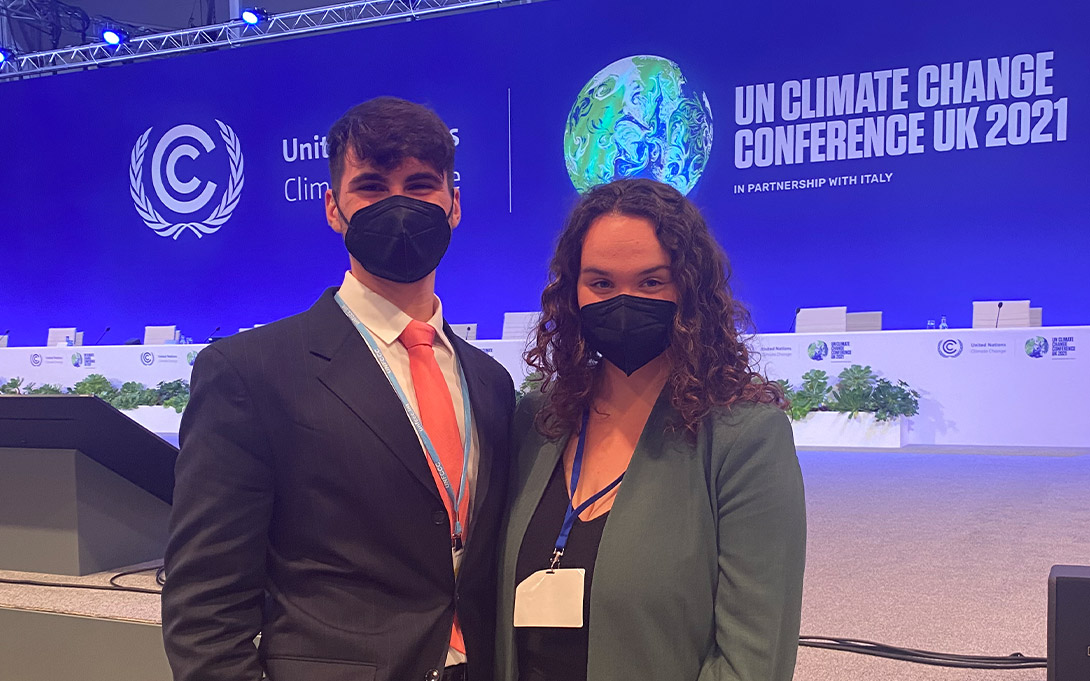
By Daniel Rivkin
Does it make sense for 40,000 people to travel from all over the world to attend a conference intended to reduce greenhouse gasses? Among the attendees, including 100 heads of state, at the COP26 climate summit in Glasgow, Scotland, in November, was a delegation of 13 University of Michigan students, seeing policymaking up close and pondering that issue, among others.
U-M has had official observer status at the annual COP (“Conference of the Parties”) meetings since 2009, and the students were able to attend briefings, plenary sessions, and receptions, and even bump into the odd world leader in the hallways.
Kristina Curtiss (MPP ’22) understands the logic of such a large convening. “I definitely think it makes sense for people to gather. The emissions that the United States puts out into the world are the same emissions that cause sea-level rising and flooding in Pacific Island nations.”
They attended presentations from Indigenous peoples from around the world, who are directly affected by the effects of climate change. In coalition together, those groups were trying to exert influence on the big nations.
A lot of the biggest criticism is that it is all rhetoric. But it does provide an opportunity for smaller countries and Indigenous people to have a voice.
A.J. Convertino
“A lot of the biggest criticism is that it is all rhetoric. But it does provide an opportunity for smaller countries and Indigenous people to have a voice. It was greater at this COP than ever before,” reports A.J. Convertino (MPP ’22), one of three Ford School-affiliated students in the delegation.
He also notes that he was able to see French President Emmanuel Macron (three times!), Bill Gates, Secretary of State Antony Blinken, and Special Climate Envoy John Kerry.
“It was eye-opening to hear how some countries were speaking about what their countries are doing to tackle climate change, as well as a cry of help from developing nations to developed nations,” says Natasha Dacic, a third year PhD candidate in the College of Engineering’s Climate and Space Sciences and Engineering Department who got her certificate in the Science, Technology, and Public Policy program in December 2021.
The final COP26 Glasgow Climate Pact did include some new elements, like a call for the end of deforestation by 2030, an electric vehicle agreement, and, for the first time, mention of phasing out fossil fuels.
Attending the conference encouraged all three to pursue their career interests in the environment.
“I hope that my work will continue to involve the environment, as I combine it with my interest in space policy, national security and defense, and scientific advancement—they are all tied together,” says Convertino.
For Curtiss, who has already begun working in an environmental consultancy, “COP provided a better understanding of what actions look like and the roles that governments, NGOs, and activists play to better shape the conversation. I feel like I am better set up as a climate advocate now understanding how all of those pieces come together and where influence lies.”
“It reminds me just how slow the bureaucratic process can be in terms of moving policy forward, especially international policy. I think local policy is a lot easier to craft and implement. So it definitely showed me what different levels of policy look like and where getting involved might be the most effective,” says Dacic.
COP27 will take place in November 2022 in Sharm El-Sheikh, Egypt.
More in State & Hill
Below, find the full, formatted spring 2022 edition of State & Hill. Click here to return to the Spring 2022 S&H homepage.
More news from the Ford School